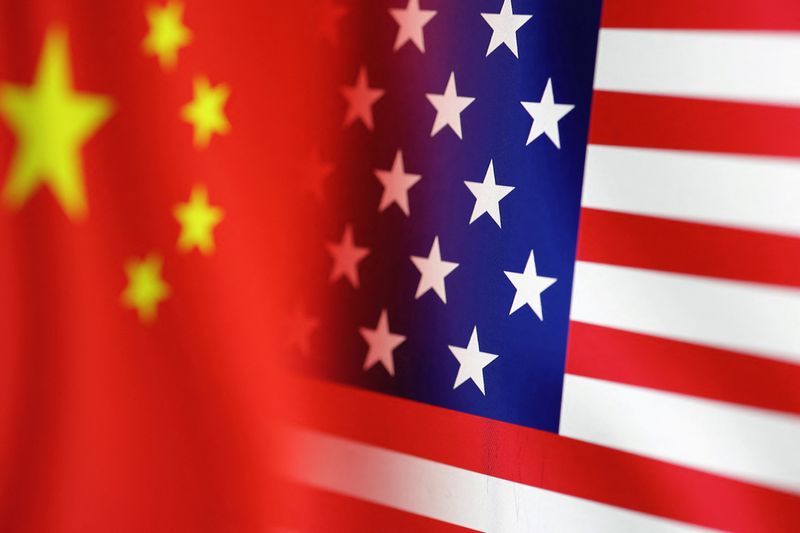By Naomi Rovnick and Dhara Ranasinghe
LONDON (Reuters) - Tensions between the West and China are rising, from tit-for-tat trade tariffs to tech rivalry and spying allegations.
The ramifications for global markets are significant, with Washington and Beijing's determination to loosen dependence on each other fraying long-established supply chains.
That could help keep inflation and interest rates elevated. Still, there are gains for emerging nations and tech giants on the right side of the power battle.
Here's how Western-China tensions are shaping markets.
1. HELLO INFLATION
U.S. President Joe Biden is determined to bring manufacturing in strategic sectors such as electric vehicles and semiconductors back home.
TSMC, the world's largest chipmaker, is moving some production to Germany to satisfy multinationals' need to diversify supply chains from China.
Goldman Sachs research found that bringing production home may have inflationary repercussions, particularly if Western manufacturing does not ramp up quickly enough to offset declining imports.
"We built a globalised world for a reason, it was efficient and cheap," said Wouter Sturkenboom, chief investment strategist for EMEA and APAC at Northern Trust (NASDAQ:NTRS).
"If we unwind some of that, it will add cost."
Prolonged U.S. inflation also means rates staying higher for longer, boosting the dollar.
A stronger dollar can export inflation to resource-importing nations in Europe by forcing them to pay more for commodities priced in dollars.
Many central banks target 2% inflation; market gauges of traders' long-term U.S. and European inflation expectations are running higher.
2. FRIENDSHORING
Washington is pushing "friendshoring" - the idea of replacing China's role in supply chains with friendly nations.
Research led by Harvard Business School's Laura Alfaro identifies Vietnam and Mexico as the major beneficiaries of the U.S. supply chain shift so far.
Mongolia is seeking U.S. investment in mining rare earths, materials used in high-tech products such as smartphones. The Philippines is courting U.S. infrastructure investment.
Anna Rosenberg, head of geopolitics at the Amundi Investment Institute, said Sino-U.S. tensions, provide a "new lens" through which to analyse emerging markets' growth prospects.
3. INDIA RUSH
India is viewed as the most able to compete with China in low-cost, large-scale manufacturing. Its large, young population and a burgeoning middle class also creates opportunities for multinationals seeing less business in China.
Indian stocks have rallied 8% this year and the prospect of investor flows into the bond market just got a boost from JPMorgan's plan to include India in a key government bond index next year.
"India is a very large opportunity," said Christopher Rossbach, chief investment officer at asset manager J. Stern. "The global companies we are invested in are working on it."
India's central bank forecasts that the economy will expand 6.5% this fiscal year, while China is expected to grow around 5% this year.
Barclays reckons that if India raises its annual economic growth closer to 8% over the next five years, it would be in a position to become the biggest contributor to global growth.
4. CHIPS TO COUTURE
A China-West clash creates winners and losers on both sides.
The EU is investigating whether to impose punitive tariffs against Chinese electric vehicle imports it says benefit from excessive state subsidies.
U.S. subsidies for domestic semiconductor manufacturing have boosted Intel (NASDAQ:INTC)'s shares. But the performance of big U.S. tech stocks and global share indices are vulnerable to signs of Chinese retaliation.
Apple (NASDAQ:AAPL) stock slid by more than 6% over two days in early September on reports that Beijing would ban government workers from using iPhones.
With China the world's dominant buyer of luxury goods, Western fashion houses are also ensnared in politics. China's top anti-corruption watchdog has vowed to eliminate what it calls the hedonism of Western elites. Chinese banks have told staff not to wear European luxury items at work.
"Higher levels of government scrutiny have started to weigh on the spending of more affluent (Chinese) consumers," Barclays analysts Carole Madjo and Wendy Liu said in a note.
Luxury sector shares surged as China loosened COVID-19 restrictions in early 2023. Since then, with China's economy in the doldrums and tensions with the West ratcheting up, they have slumped. European luxury stocks slid 16% in Q3.
5. SELL CHINA?
A faltering economy and property market turmoil mean the bearish China investment case extends beyond politics.
But the prospect of continued tariffs and the hassle of navigating U.S. restrictions on investing in Chinese technology does not help.
With China underperforming global stocks, investors are split on how to approach this market.

A JPMorgan survey of credit investors found that 40% were bearish on China, but almost the same proportion wanted to increase allocations.
"I'm actually warming to China because everyone hates (this market) so much," said RW Baird vice chair of equities Patrick Spencer. "Market expectations are really severe and the reality is slightly better."